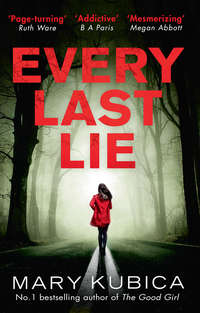
Полная версия
The Good Girl: An addictively suspenseful and gripping thriller
Grace gets mad. “What does that mean? Clothes, food, weapons—guns, bombs, knives—an artists’ easel and a watercolor set? You ask me,” she says, pilfering the sketch pad from Mia’s hands, “this is out of the ordinary. A kidnapper doesn’t normally allow his abductee to draw the evidence on a cheap, recycled sketch pad.” She turns to Mia and presents the obvious. “If he sat still this long, Mia, long enough for you to draw this, then why didn’t you run?”
She stares at Grace with a stark expression on her face. Grace sighs, completely exasperated, and looks at Mia like she should be locked up in a loony ward. Like she has no grasp on reality, where she is or why she’s here. Like she wants to bang her over the head with a blunt object and knock some sense in her.
I come to her defense and say, “Maybe she was scared. Maybe there was nowhere to run. The cabin was in the middle of a vast wilderness, and northern Minnesota in the winter verges on a ghost town. There would have been nowhere to go. He might have found her, caught her and then what? Then what would have happened?”
Grace sulks into her chair and flips through the pages of the sketch pad, seeing the barren trees and the never-ending snow, this picturesque lake surrounded by dense woodland and...she nearly passes by it altogether and then flips back, ripping the page from its spiral binding, “Is that a Christmas tree?” she implores, gawking at the nostalgic image on the inner corner of a page. The tearing of the paper makes Mia leap from her seat.
I watch Mia startle and then lay a hand briefly on hers to put her at ease. “Oh, yeah,” I laugh, though there’s no amusement in it. “Yeah, I guess that would be considered out of the ordinary, wouldn’t it? We found a Christmas tree. Charming really, if you ask me.”
Colin
Before
She’s fighting the urge to fall asleep when the call comes in. She’s said about a thousand times that she needs to go. I’ve assured her that she doesn’t.
It took every bit of self-control to pull away from her. To turn my back to her pleading eyes and force myself to forget it. There’s just something wrong with screwing the girl you’re about to snatch.
But somehow or other I convinced her to stay. She thinks it’s for her own good. When she’s sober, I said, I’d walk her down for a cab. Apparently she bought it.
The phone rings. She doesn’t jump. She looks at me with the implication that it must be a girl. Who else would call in the middle of the night? It’s approaching 2:00 a.m. and as I move into the kitchen to take the call, I see her rise from the couch. She tries to fight the lethargy that’s taken over.
“Everything set?” Dalmar wants to know. I know nothing about Dalmar other than he just hopped off a boat and is blacker than anything I’ve ever seen. I’ve done jobs for Dalmar before: larceny and harassment. Never kidnapping.
“Un-huh.” I peek out at the girl who’s standing awkwardly in the living room. She’s waiting for me to finish up the call. Then she’ll split. I move away. I get as far away as I can. I carefully slide a semiautomatic from the drawer.
“Two-fifteen,” he says. I know where to meet: some dark corner of the underground where only homeless men wander at this time of night. I check my watch. I’m supposed to pull up behind a gray minivan. They grab the girl and leave the cash behind. That easy. I don’t even have to get out of the car.
“Two-fifteen,” I say. The Dennett girl is all but a hundred and twenty pounds. She’s lost in the midst of insobriety and a splitting headache. This will be easy.
She’s already saying that she’s gonna go when I come back into the living room. She’s headed to the front door. I stop her with a single arm around her waist. I draw her away from the door, my arm touching flesh. “You’re not going anywhere.”
“No, really,” she says. “I have to work in the morning.”
She giggles. Like maybe this is funny. Some kind of come-on.
But there’s the gun. She sees it. And in that moment, things change. There’s a moment of recognition. Of her mind registering the gun, of her figuring out what the fuck is about to happen. Her mouth parts and out comes a word: “Oh.” And it’s almost an afterthought, really, when she sees the gun and says, “What are you doing with that?” She backs away from me, bumping into the couch.
“You need to come with me.” I step forward, closing the gap.
“Where?” she asks. When my hands come down on her, she jerks away. I unknot the arms and reel her in.
“Don’t make this harder than it has to be.”
“What are you doing with that gun?” she snaps. She’s calmer than I expect her to be. She’s concerned. But not screaming. Not crying. She’s got her eyes bound to the gun.
“You just need to come with me.” I reach out and grasp her arm. She’s trembling. She slips away. But I hold her tight, twisting her arm. She cries out in pain. She shoots me a dirty look—hurt and unexpected. She tells me to let go, to keep my hands off her. There’s a superiority in her voice that pisses me off. Like she’s the one running this show.
She tries to rip free but finds she can’t. I won’t let her.
“Shut up,” I say. I grip her wrist tighter and I know it hurts. My grasp is hurting her, leaving red finger marks along the flesh.
“This is a mistake,” she barks. “You’ve got this all wrong.” There’s this strange composure to her, though her eyes remain glued to the gun. I can’t tell you how many times I’ve heard that line. Every so-called victim says I’ve made a mistake.
“Shut up,” I snap this time. With more authority. I back her against the wall, bumping into a lamp as I do. It crashes to the floor, hitting the parquet with a nasty thud. The lightbulb shatters. But the lamp doesn’t break.
I hold her there. I tell her to shut up. I say it over and over again. Just shut the fuck up.
She isn’t saying a word. She’s got on her poker face, though inside she must be going ballistic.
“Okay,” she says then, as if this is her choice. As if she has any say in the matter. She nods her head scornfully. She’ll come with me. Her eyes are steady. Tired, but steady. Pretty, I think. She has pretty blue eyes. But then I force the thought from my mind. I can’t think about shit like that. Not right now. Not before I hand her over to Dalmar. I need to finish the job. Be through with it before I start to second-guess myself.
With the gun pressed to her head, I tell her how it’s going to be. She’s gonna come with me. If she screams, I’ll pull the trigger. It’s that simple.
But she’s not going to scream. Even I can see that.
“My purse,” she says as we step over the bag she dropped to the floor when we made our way into the apartment, hours ago, floundering with each other’s clothes.
“Forget your fucking purse,” I snarl. I drag her into the hallway, slam the door shut.
It’s cold outside. The wind is sailing in from the lake, blowing her hair about her face. She’s freezing. My arm is wrapped tightly around her torso. Not for warmth. I don’t give a damn if she’s cold. I don’t want her to run away. I hold her so tight that her left side rubs against my right side and at times our feet collide and we trip. We walk quickly, hurrying to the car parked on Ainslie.
“Hurry up,” I say more than once, though we both know it’s me that slows us down. I look behind, make sure we’re not being trailed. She’s staring at the ground, trying to avoid the cutting wind. Her coat has been abandoned in the apartment. Goose bumps line her skin. Her flimsy shirt fails to ward off the cold, early October air. There’s no one on the street tonight but us.
I open the door for the girl and she gets in. I don’t take the time to fasten my seat belt. I start the car and take off down the street, doing a U-turn on Ainslie and heading the wrong way on a one-way street.
The streets are all but empty. I drive too fast, knowing that I shouldn’t, but wanting this to be through. She’s silent, her breathing steady. She’s strangely sedate. Though out of the corner of my eye I see her shake: the cold, the fear. I wonder what she thinks. She doesn’t plead with me. She huddles into a ball on the passenger’s seat of the pickup and stares out at the city.
It won’t be long before we pull up behind the minivan and Dalmar’s men will tear her from the truck, their dirty hands all over her. Dalmar has a temper. I don’t know what they have planned for the girl. Ransom. That’s all I know. Hold her for ransom until her father coughs up a substantial debt. When the debt is paid, I don’t know what they’ll do. Kill her? Send her back home? I doubt it. And if they do, it’s only after Dalmar and his guys have had a little fun with her, made it worth their while.
My mind starts racing in a million different directions. And now I’m thinking what will happen if I get caught. It’ll all be for nothing. Kidnapping carries up to a thirty-year sentence. I know. I checked. I thought about that more than once, after Dalmar hired me. But it’s one thing to think about it, and another to do it. Now here I am, with the girl in the car, thinking about thirty years in the pen.
She won’t look at me. At a stoplight, I stare at her. She stares ahead and I know she can see me. I know she can feel my eyes on her. She holds her breath. She fights the urge to cry. I drive with one hand, the gun on my lap in the other.
It’s not so much that I give a shit about the girl. Because I don’t. It’s that I’m wondering what happens when word leaks back home that I did this. When my name is attached to a kidnapping/murder. And it would be. Dalmar would never sign his name to this. He’d set me up. If and when this goes bad, I’ll be the stooge, the scapegoat, the one on the chopping block.
The light turns green. I get off on Michigan. A bunch of drunken kids stand on the corner waiting for their bus. They’re monkeying around, being stupid. One of them stumbles from curb. I swerve out of the way and almost hit him. “Idiot,” I mutter beneath my breath. He gives me the finger.
I consider my backup plan. I always have a backup plan, for if and when things get messy. I’ve just never had to use it. I check the gas gauge. There’s enough to get us out of the city, at least.
I should get off at Wacker. The red numbers on the truck’s dashboard read 2:12. Dalmar and his guys are in place, waiting. He could do it by himself, but he wouldn’t. Dalmar never wants to get his hands dirty. He finds someone, some outcast like me to do the shit work, so he can sit back and watch. This way, when things go south, he’s clean of any misdeeds. No fingerprints at the scene, his face omitted from any photographic evidence. He lets the rest of us, his operatives he calls us, like we’re in the damn CIA, take the fall.
There’s probably four of them in the van, four thugs just waiting to restrain this girl who sits still beside me when she could be fighting for her life.
My hands slip on the steering wheel. I’m sweating like a pig. I wipe them on my jeans and then I pound a fist against the steering wheel and the girl lets out a stifled cry.
I should get off at Wacker, but I don’t. I keep driving.
I know this is stupid. I know everything that can go wrong. But I do it anyway. I peer in the rearview mirror, make sure that I’m not being trailed. And then I floor it. Down Michigan, to Ontario, and I’m on 90 before the clock ever reaches 2:15.
I don’t say anything to the girl because there isn’t anything I could say that she’d believe.
I’m not sure at what point it happens. It’s somewhere as we’re driving away from the city, as the skyline starts to disappear into the blackness, as the buildings get swallowed up by the distance. She squirms in her seat, the composure starting to wane. Her eyes move: out the side window, turning around and staring out the rear window as the city melts away. As if someone finally flipped the switch and now she realizes what the hell is happening. “Where are we going?” she demands, her voice becoming hysterical. The poker face has given way to gaping eyes, to ruddy skin. I see it in the glow of streetlights we fly past, illuminating her face every five seconds or so.
For a split second she begs me to let her go. I tell her to shut up. I don’t want to hear it. By now she’s crying. Now the water works have begun and she’s a blubbering mess, begging me to let her go. She asks again: Where are we going? And I pick up the gun. I can’t stand the sound of her voice, blaring and shrill. I need her to shut up. I point the gun at her and tell her to shut the fuck up. And she does. She’s quiet, but she continues to cry, wiping her nose on a too-short sleeve as we soar out of the city and into suburbia, trees swapping places with skyscrapers, the Blue Line snaking down the middle of the road.
Eve
After
Mia sits at the kitchen table, holding a legal-size manila envelope with her name written on the front in a very masculine all-caps script.
I prepare dinner for Mia and myself. The TV is on in the next room for background noise, but the sound drifts into the kitchen, compensating for the silence between us. Mia doesn’t seem to notice, but these days, it makes me a nervous wreck, and so I make idle conversation to offset the silence.
“Would you like chicken breast with your salad?” I ask and she shrugs. “Whole wheat rolls or white?” I ask but she doesn’t respond.
“I’ll make the chicken,” I say. “Your father would like chicken.” But we both know that James will not be home.
“What’s that?” I ask, motioning to the item in her hands.
“What’s what?” she asks.
“The envelope.”
“Oh,” she says. “This.”
I set a frying pan on the stove, slamming it down without intent. She starts, and I’m quick to apologize, filled with shame. “Oh, Mia, honey, I didn’t mean to startle you,” I say and it takes a moment for her to settle, to attach the rapid heartbeat and beads of sweat to the sound of the frying pan.
She says that she doesn’t know why she feels like this.
She says that she used to enjoy when darkness set in, when the outside world changed. She describes it for me: the way the streetlights and buildings twinkled in the night sky. She says that she liked the anonymity of it, and all the possibilities that developed when the sun went to sleep. But now the darkness terrifies her, all the nameless things on the other side of the silk drapes.
Mia never used to be afraid. She would wander city streets well after dark and feel perfectly safe. She confides that she often found solace in deafening traffic, obtrusive car horns and sirens that blared at all times of the night. But now the sound of a frying pan rattles her nerves.
I’m overly apologetic, and Mia tells me that it’s all right. She listens to the television in the other room. The evening news has given way to a seven o’clock sitcom. “Mia?” I ask and she turns to me.
“What?” she asks.
“The envelope.” I motion toward it and it’s then that she remembers.
She turns it over in her hands. “That policeman gave it to me,” she says.
I’m slicing a tomato. “Detective Hoffman?”
“Yes.”
Mia usually only comes downstairs when James is gone. The rest of the time she hides. I’m certain this room must remind her of her childhood. The room is the same as it’s been for a dozen years or more: the paint, the color of butter, the mood lighting. Candles are lit. The track lighting is dimmed. The table is a dark pedestal table with scrolled legs and matching upholstered chairs, where she spent too much time under a microscope as a child. I’m certain she feels like a child, unable to be left alone, having to be cooked for and constantly watched. Her independence is gone.
Yesterday she asked when she could go home, to her own apartment, and all I replied was in time.
James and I don’t let her leave the house, not unless we’re going to see Dr. Rhodes or to the police station. Running errands is out of the question. For days the doorbell rang from dawn to dusk, men and women with microphones and video cameras awaiting us on the front stoop. Mia Dennett, we’d like to ask you a few questions they’d demand, forcing their microphones at Mia, until I told her not to open the door, and started ignoring the chime altogether. The telephone rang relentlessly, and those infrequent times I did answer it, the only thing I ever said was, “No comment.” After a day or so, I started letting it go straight to voice mail, and then, when the ringing became too much to bear, I unplugged the phone from the wall.
“Well, aren’t you going to open it?” I remind Mia.
She slides her finger under the flap and lifts it open. There’s a single sheet of paper inside. She draws it carefully from the envelope and takes a look. I set the knife on a cutting board and saunter to the table beside Mia, feigning only a little interest when I’m absolutely certain I’m the more attentive of us two.
It’s a photocopy, a drawing from a sketch pad, with circles lining the top where the original was ripped from its spiral binding. It’s a drawing of a person, a woman, I can only assume from the longish hair.
“I drew this,” Mia says to me, but I slip the drawing from her hands.
“May I?” I ask, dropping into the chair beside her. “Why do you say that?” I ask, my hands beginning to tremble, my stomach turning somersaults inside me. Mia has been drawing for as long as I can remember. She’s a talented artist. I asked her once why she loved to draw, why it was something with which she was so enamored. She told me that she drew because it was the only way she could bring about change. She could turn geese to swans or a cloudy day to sun. It was a place where reality didn’t have to exist.
But this picture is something else entirely. The eyes are perfectly circular, the smile the sort she learned to draw in grade school. The eyelashes are upwardly pointing lines. The face is malformed.
“It came from the same notebook, the one Detective Hoffman had. The one with my drawings.”
“You didn’t draw this,” I say with absolute certainty. “Maybe ten years ago. When you were first learning. But not now. This is much too ordinary for you. It’s mediocre at best.”
A timer beeps and I rise to my feet. Mia reaches for the page to have a second look. “Why would the policeman give this to me then?” she asks, turning the envelope over in her hands. I tell her that I don’t know.
I’m setting whole wheat rolls onto a cookie sheet that will bake in the oven, when Mia asks, “Then who? Who drew this?” On the stove, the chicken sears.
I lower the cookie sheet into the bottom of the oven. I flip the chicken, and begin dicing a cucumber as if perhaps it was Colin Thatcher himself lying on the cutting board before me.
I shrug my shoulders. “That picture,” I say, trying hard not to cry. Mia sits at the table, examining that picture, and I see it, clear as day: the long hair, the circular eyes, the U-shaped smile. “That picture,” I say, “it’s you.”
Colin
Before
We’re on the Kennedy before I ever bother to turn on the heat. Somewhere into Wisconsin I turn on the radio. Static blares out of the rear speakers. The girl is watching out the side window. She doesn’t say a thing. I’m certain a pair of headlights has followed us the entire length of Interstate 90, but they disappear just outside of Janesville, Wisconsin.
I exit the interstate. The road is dark and deserted and seems to lead to nowhere. I pull into a gas station. There isn’t an attendant on duty. I kill the engine and get out to fill up the tank, bringing the gun with me.
I’ve got my eyes on her the entire time, when I see a glow from inside the truck, the light from a cell phone that’s come to life. How could I be so stupid? I thrust open the door, scare the shit out of her. She jumps, tries to hide the phone under her shirt.
“Give me your phone,” I snap, ticked I forgot to ditch her phone before we left.
The light from the gas station fills the truck. She’s a damn mess, makeup down her face, her hair a catastrophe. “Why?” she asks. I know she’s not this dumb.
“Just give it to me.”
“Why?”
“Just give it to me.”
“I don’t have it,” she lies.
“Give me the fucking phone,” I yell as I reach over and yank it from beneath her shirt. She tells me to get my hands off her. I check the phone. She got as far as finding the contact list but that’s all. As I go to fill up the tank, I make sure it’s off, then dump it into the trash. Even if the cops trace the signal, we’ll be nowhere around when they do.
I scavenge the back of the truck for something—rope, an extension cord, a piece of fucking string. I bind her hands together, tight enough that she cries out in pain. “Try that again,” I say when I get back in the truck, “and I’ll kill you.” I slam the door and start the engine.
There’s only one thing that’s certain: when I didn’t show up with the girl, Dalmar sent everyone he knows after us. By now they’ve torn apart my apartment. There’s a hit out on both our heads. There isn’t a chance in hell I’m going back. If this girl is dumb enough to try, she’ll be dead. But I won’t let that happen. She’ll tell them where I am before they kill her, but I’ll kill her first. I’ve already done enough good deeds.
We drive through the night. She closes her eyes, only for a couple of seconds, then jerks them open again and searches the truck to realize that it isn’t a nightmare. It’s all real: me, the dirty truck, its vinyl seats torn, cotton falling out, the static on the radio, the endless fields and the dark night sky. The gun sits on my lap—I know she doesn’t have the guts to reach for it—and my hands clutch the steering wheel, as I drive slower now that I know we’re not being followed.
She asks once why I’m doing this, her voice shaking as she speaks. “Why are you doing this to me?” she asks. It’s somewhere around Madison. She’d gone all this time in silence, listening to some Catholic priest ramble on and on about original sin, his voice cutting out every third or fourth word. And then all of a sudden, Why are you doing this to me, and it’s the to me part that really rubs me the wrong way. She thinks it’s all about her. It doesn’t have a thing to do with her. She’s a pawn, a puppet, a sacrificial lamb.
“Don’t worry about it,” I say.
She doesn’t like this answer. “You don’t even know me,” she accuses in a patronizing way.
“I know you,” I say with a fleeting look her way. It’s dark in the car. I can’t see more than an outline, obscured by the blackness outside the window.
“What did I do to you? What did I ever do to you?” she pleads.
She never did a thing to me. I know it. She knows it. But I tell her to shut up anyway. “Enough.” And when she doesn’t I say it again. “Just shut up.” The third time I scream, “Just shut the fuck up,” the gun flailing about and pointing her way. I swerve off the road and slam on the brakes. I step from the truck and already she’s screaming at me to leave her alone.
I reach in the bed of the truck for a roll of duct tape, tear off a piece with my teeth. There’s a chill in the air, the sound of the occasional semitruck soaring down the road in the middle of the night. “What are you doing?” she asks, her feet kicking at me the minute I open her door. She kicks hard and gets me in the gut. She’s a fighter, I’ll give her that, but the only thing it does is make me pissed. I force my way into the truck, slap the duct tape over her moving lips and say, “I told you to shut up.”
And she does.
I get back in the truck and slam the door, pulling blindly out onto the interstate, the wheels kicking up gravel from the shoulder of the road.
It’s no wonder then that it takes a good hundred or so miles for her to tell me she has to pee, to get the guts to lay a trembling hand on my arm and get my attention.
“What?” I snap, pulling my arm away from her hand. It’s approaching dawn. She’s wiggling in her seat. There’s a sense of urgency in her eyes. I rip off the duct tape and she lets out a moan. It hurt. It hurt like hell.
Good, I think to myself. That’ll teach her to keep her mouth shut when I tell her to.





